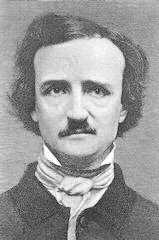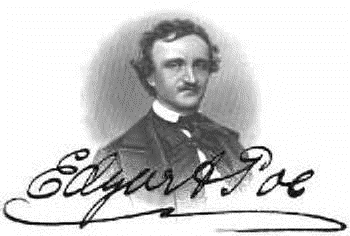|
Craig White's authors |
 |
Edgar Allan Poe (1809-49) life, status, style, and subjects |
 |
Two centuries after Poe's brief life, quirky issues concerning his life and death, his gothic-Byronic image, and the mysterious nature of many of his writings exert a unique power that leads readers to re-imagine and romanticize Poe as though he were a character in one of his stories.
Such attitudes can lead to a critical error known as the biographical fallacy—the tendency to reduce great works of literature to mirrors of their authors' lives, when the authors' lives are typically less interesting and productive of meaning than their writings.
No one living today would have any interest in Poe or his life if he hadn't written great poetry and fiction, so any discussion of Poe must start with his writings and their power to fascinate one generation of readers after another.
Therefore readers of this page are urged not to focus on Poe's life—though his unfortunate experiences with beloved women dying young may have influenced his aesthetics. (See his Philosophy of Composition.)
Readers are instead encouraged to study Poe's unique status, his musical style, and his archetypal subject matter. For this page's account of his life, scroll further down.
![]()
Poe's status in American and World literature:
Around the world and especially in Europe, Poe stands among the best-known, most popular and influential American authors.
Academic criticism in the United States is often less enthusiastic, regarding Poe as a popular author recycling familiar gothic themes and obsessions.
Poe's influence is undeniable, however, and many authors and critics remember first reading Poe as an awakening to the imaginative and sensory power of literature.
Authors influenced by or associated with Poe's styles: Robert Louis Stevenson (Dr. Jekyll and Mr. Hyde), H. P. Lovecraft, Jorge Luis Borges, William Faulkner (southern gothic), Arthur Conan Doyle (Sherlock Holmes), Stephen King, Anne Rice, and others.
Poe's greatest gift may be the hardest to define: the pure sensory pleasure of the surface of his prose, which can sound more like poetry and create in his reader a hypnotic, dream- or fugue-like state that matches the mental excitement or derangement described in his characters. (See "musicality" below.)
Since the poetic surface of Poe's writing is impossible to duplicate, his greatest contribution to literary history may be his invention or development of genres that continue today: the detective story, science fiction, the gothic. (See "subject matter" below.)
![]()
Poe's literary quality and techniques: (These qualities apply to his prose and poetry.)
-
Along with Tennyson, Poe is among the most musical writers in English. His poems achieve this musicality partly through careful meter and rhyme but also through a certain dreaminess in his rhythms and a sensory pleasure in his diction or word choice.
- European
gothic: ancient buildings,
family curses, esoteric learning
- Gothic color scheme: black and white +
red or other lurid color ("blood-red moon" at conclusion of
"Usher," "drop of ruby fluid" in "Ligeia")
-
romance narrative as
desire & loss
- "Excess" or extremes as Romantic rhetoric: Poe's chief rhetorical technique is to pile on superlatives ("the most," "the greatest," "the darkest," "even darker than the darkest . . . ") to elevate consciousness to extremes of fear, horror, the sublime, etc. Poe also indulges rhetorical excess through use of catalogs or detailed observations that are not so much realistic as overwhelming, suffocating, or ecstatic.
Poe's subject matter:
Poe is at or near the origin of several important popular genres:
- Poe invented the
detective story ("The Purloined Letter," "The Mystery
of Marie Roget," "The Murders in the Rue Morgue"), influencing the author of
the later Sherlock Holmes stories and many other detective writers.
-
Many Poe stories anticipate science fiction, especially his one novel, The Narrative of Arthur Gordon Pym (1838)
-
The gothic and horror genres were already well-developed by the time Poe wrote his gothic tales, but his development of horror strongly influenced Robert Louis Stevenson (Dr. Jekyll and Mr. Hyde) and other later horror writers.
-
Gothic as psychology: haunted castle as haunted mind (correspondence between internal and external worlds)
Death of a beautiful woman as most intense aesthetic experience. As Poe wrote in "The Philosophy of Composition," . . .
"the death then of a beautiful woman is unquestionably the most poetical topic in the world, and equally is it beyond doubt that the lips best suited for such topic are those of a bereaved lover."
(Feminist studies of literature may well criticize this theory as typical of antebellum / Victorian literature's objectification of women, even while praising them.)
![]()
Poe's life and its relation (or not) to his writings:
Poe started life with three gifts:
1. He was handsome and athletic.
2. He was a verbal and intellectual genius.
3. For a few years of his early life his semi-adoptive family provided him with loving care, financial support, and education.
Despite these blessing (or perhaps to some degree caused by them), from the start Poe's life was insecure—alternately lucky and unlucky, threatened and redeemed, plagued by poverty and alcoholism or struggling to recover from either.
Above all, his life was brief. Poe was born in the same year as Abraham Lincoln—1809—but died 16 years before Lincoln, whose own life was cut short in 1865.
Edgar Poe was born in Boston to a popular stage actress, Elizabeth Hopkins Poe, and David Poe, also an actor who abandoned his wife and three children in 1810. In 1811 Mrs. Poe died of tuberculosis or consumption—the first of several similar losses in Poe's life, where a woman who loved and cared for him died and left him more or less on his own.
Around the age of three, Poe was informally adopted by one his mother's admirers, Mrs. Frances Valentine Allan, wife of John Allan, a Scottish-American merchant. Poe lived in the Allan home in Richmond, Virginia, was given the name Edgar Allan Poe, and was baptized in the Episcopal Church. From 1815-1820 the Allans lived in Scotland and England, where Edgar studied at boarding schools, one of which inspired the setting for his story William Wilson.
In 1820 the Allan family returned to Richmond, where John Allan inherited considerable wealth and built an impressive new home for his family. Poe registered as a student at the University of Virginia in 1826, the year of the death of Thomas Jefferson, who founded the University in 1819. Poe ran up debts and asked for more support from Mr. Allan. Under increasing financial burdens (perhaps due to gambling) Poe left the university to work in Boston in 1827 as a clerk and newspaper writer. Poe subsequently enlisted in the U.S. Army for two years and published a book of poems that received little notice. In 1829 Mrs. Allan died, and Mr. Allan helped arrange Poe's discharge from the Army and his enrollment at West Point Military Academy. Before traveling to West Point, Poe visited and lived with his mother's sister Maria Clemm, her daughter Virginia, his brother David, and their grandmother in Baltimore. During this period Poe published a second book of poems.
Following quarrels with John Allan, Poe was court-martialed and dismissed from West Point and moved to New York in 1831, where he published a third book of poems. That year he returned to the Clemms in Baltimore, where his brother soon died. Poe began a serious attempt to earn his living as an author, first writing stories and then working as an editor and critic for for literary and political magazines that sprouted during the American Renaissance. Poe changed employment frequently owing to uncertain finances and worsening alcoholism. In 1835 Poe, then 26, secretly married his 13-year-old cousin Virginia.
Instead of feeling scandalized about Poe's marriage to an adolescent cousin, students might regard it as another attempt by Poe to find a stable family life. His mother-in-law was his late father's sister, and Poe referred to her as his mother. Poe's marriage to Virginia Clemm may have been celibate, with the two living together more as brother and sister. There is no evidence that she ever became pregnant. Marriage of first cousins was less unusual before the 20th century, and women sometimes married soon after puberty. Poe's struggles to reconstruct a lost family life may be compared to stories in popular sentimental or domestic fiction of the time like The Wide, Wide World and The Lamplighter.
In 1842 Virginia became ill from tuberculosis or consumption, breaking a blood vessel in her throat while singing.
In 1845 Poe gained fame—but not wealth—by publishing his popular poem The Raven.
Virginia died in 1847. Poe's subsequent attachments to other women came to nothing, and in October 1849 the author was found "delirious" on the streets of Baltimore, dressed in clothes that were not his own. He died the following day. All medical records of Poe's death are lost, and many theories regarding his end have rushed to fill the void—yet another instance of Poe's readers creating Romantic fiction from his life.
Overall, we probably gain less by romanticizing Poe's life or projecting it onto his writings than we gain by admiring how much he accomplished in only 40 years.
Despite the risks of the biographical fallacy, readers of Poe are inevitably attracted to him as an author and personality, so this attraction must be worked with and taken advantage of as far as it's productive.
The single biographical factor in his life that repeatedly occurred in his life and appears in his poetry is the death of women with whom Poe had a loving, supportive relationship:
Poe's mother died when he was a toddler.
His stepmother Mrs. Allan died when he was 18.
His wife Virginia died in 1847 when Poe was 38.
The year before Virginia's death, Poe wrote in "The Philosophy of Composition," . . .
"the death then of a beautiful woman is unquestionably the most poetical topic in the world, and equally is it beyond doubt that the lips best suited for such topic are those of a bereaved lover."
Regardless, readers identify Poe with the protagonists or narrators of his stories—the biographical fallacy.
Poe's narrators and protagonists are often mentally and emotionally stressed to the point of derangement or madness. In response, students will sometimes say, "I like Poe because he was an insane drug addict." Such characterizations are often extended to imagining that Poe was a wealthy European who lived in an ancient, haunted castle.
Such an attitude charmingly exposes Americans' spontaneous identification with outsiders who don't fit our conformist lifestyles, but the identification is not based on any fact.
Facts supporting: Poe was informally adopted by a wealthy Virginia family (the Allans) and for a few years lived as a child in England.
Opium and other now-illegal narcotics were widely available in the 1800s and served much the same purpose as now, namely easing the pain of people who lack health insurance and can't afford prescription pain-relievers or therapies. The poet Coleridge, for instance, used opium as relief for pain from infected teeth.
Facts against: As a young adult Poe was disowned by his stepfather and struggled with poverty for most of his life. Poe was an alcoholic, not a drug addict.
